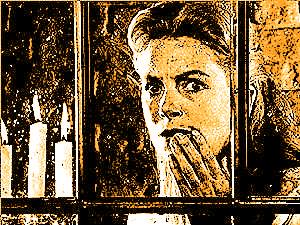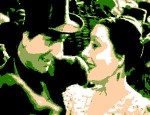Film Review

The Innocents started out as an adaptation of a stage version (of the same title) of James's story by William Archibald, with an original script supplied by the play's author, but Clayton was unimpressed by Archibald's over-insistence on the reality of the ghosts in the story and sought a more ambiguous interpretation. To that end he hired the celebrated American writer Truman Capote to rewrite the script, bringing to it something of the distinctive Southern Gothic feel of his early autobiographical novel Other Voices, Other Rooms. Clayton was a great admirer of Capote, having worked with him on John Huston's Humphrey Bogart vehicle Beat the Devil (1953), and Capote welcomed the opportunity to take a break from writing the book that would bring him international renown, In Cold Blood. Clayton subsequently hired Capote to write the screenplay for his big budget Hollywood version of The Great Gatsby, but the script was rejected by the film's producer because it was (apparently) too faithful to F. Scott Fitzgerald's original novella.
In both its eerie Gothic style and narrative themes The Innocents is more than vaguely reminiscent of Robert Wise's The Haunting (1963), and whilst it isn't quite as nerve-racking as the later film it is just as unsettling and visually startling. Although it wasn't Clayton's intention, there are stark visual motifs, along with unusual camera and lighting effects, that make the film a close cousin of such revered Southern Gothic offerings such as Suddenly, Last Summer (1959) and Hush... Hush, Sweet Charlotte (1964). Freddie Francis's high contrast, deep focus photography imbues the entire film with an oppressively claustrophobic feel that powerfully conveys a sense of the complex, deeply rooted neuroses that appear to be driving the heroine towards the precipice of insanity. The Innocents is a masterpiece of textual ambiguity. It is left to the spectator to decide whether what is shown on the screen is real or the deranged fantasy of an extremely disturbed, sexually repressed ageing spinster. As a result, the film succeeds marvellously both as a supernatural thriller and as a twisted psychological drama, every bit as chilling and surprising as Hitchcock's Pyscho (1960) - and just as compelling.
As the tormented not-quite-over-the-hill governess Miss Giddens, Deborah Kerr turns in what must surely rate as the finest performance of her career, at first as sweetly prim and vulnerable as she was in The King and I (1956), but becoming ever more forceful and neurotic - even sinister - as the film progresses towards its truly terrifying climax. It is through her eyes that we see the sweetly precocious boy Miles (admirably played by Martin Stephens, famous for his role in Village of the Damned) change from a complete innocent to a sexually alluring youngster (looking positively Byronic in a few shots). Miss Giddens' paedophilic tendencies are easily overlooked on a first viewing of the film, but on subsequent viewings they become hard to miss, particularly the full-on kiss that appears towards the end and leaves no doubt as to the governess's true feelings for the little boy in her charge. The intense erotic power in this fleeting shot is surely the film's most shocking moment - if you are alert enough to notice it. It is arguably its overt, albeit incredibly subtle, handing of such a taboo subject that makes The Innocents such a remarkable film for its time, but it is the film's sheer unique unremitting strangeness that gives it its lasting impression. Like the barely discerned ghost of Miss Jessel it will haunt you for many a day after you have seen it, and ultimately you will have no choice but to return to it and immerse yourself in its sublime seductive weirdness.
© James Travers 2024
The above content is owned by frenchfilms.org and must not be copied.
Film Synopsis
England in the late 1800s. Miss Giddens, an independently minded woman in her early thirties, accepts the position of governess to two young children living on a large country estate. The post is offered to her by the children's bachelor uncle, on the strict understanding that he is never to be troubled by her if any problems arise. When Miss Giddens first meets the children, Miles and Flora, they appear to be the model of innocence, but, on learning that Miles was expelled from school for bad behaviour, the new governess soon begins to suspect that things are not what they seem. The kindly old housekeeper Mrs Grose reveals that the children may have been influenced by their previous governess, Miss Jessel, and her violent lover, Mr Quint, who both died the previous year in mysterious circumstances. After seeing what she believes to be the ghosts of Miss Jessel and Mr Quint, Miss Giddens becomes totally convinced that their wicked spirits have taken possession of the two children. She takes it upon herself to save the children before it is too late, but as she does so her relationship with Miles takes an unexpected turn...© James Travers
The above content is owned by frenchfilms.org and must not be copied.
Similar Films
Here are some other films you may enjoy watching:- The Howling (1981)
- Corruption (1968)
- The Brides of Dracula (1960)
- Crescendo (1970)
- The Haunting (1963)
Other related links:
Film Credits
- Director: Jack Clayton
- Script: Henry James (novel), John Mortimer (dialogue), William Archibald (play), Truman Capote
- Cinematographer: Freddie Francis
- Music: Georges Auric
- Cast: Deborah Kerr (Miss Giddens), Peter Wyngarde (Peter Quint), Megs Jenkins (Mrs. Grose), Michael Redgrave (The Uncle), Martin Stephens (Miles), Pamela Franklin (Flora), Clytie Jessop (Miss Jessel), Isla Cameron (Anna), Eric Woodburn (Coachman)
- Country: USA / UK
- Language: English
- Support: Black and White
- Runtime: 100 min
The very best French thrillers

The greatest French Films of all time

The very best sci-fi movies
